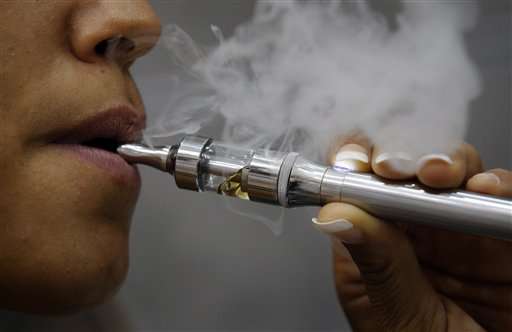In this Oct. 8, 2013 file photo, Kathleene, an electronic cigarette store employee, smokes an electronic cigarette in Paris. The European Union's top court has approved on Wednesday May 4, 2016 new rules requiring plain cigarette packs, banning menthol cigarettes and regulating the growing electronic cigarette market.(AP Photo/Christophe Ena, File)
The European Union's top court dealt a blow to the tobacco industry Wednesday by approving sweeping new rules that will require plain cigarette packs, ban menthol cigarettes and regulate the growing electronic cigarette market.
Tobacco companies had protested a 2014 EU directive on the new rules, calling it disproportionate. But the European Court of Justice on Wednesday upheld the directive, arguing it's in line with efforts to fight smoking and protect public health.
The court said it is OK to ban menthol and other flavorings that make tobacco more appealing. The directive also requires standardized, plain labels that cover at least 65 percent of all cigarette packs with health warnings.
The rules will require warnings for e-cigarettes, limit their nicotine levels to 20 grams and restrict advertising and sponsorship by their makers.
The Independent British Vape Trade Association said in a statement that it is disappointed by the ruling and argued it could push some e-cigarette smokers back to tobacco.
Poland, which appealed the 2014 tobacco directive, seemed to accept the verdict, but said in a statement issued by the ministry of Development it was able to postpone the ban on menthol cigarettes until Jan. 1, 2020.
According to the statement, Poland is EU's fourth-largest tobacco producer and second-largest producer of flavored cigarettes. Some 6.3 billion menthol cigarettes were produced in Poland in 2013.
Among those welcoming the decision was French Health Minister Marisol Touraine, who said plain cigarette packs will be required in France starting May 20.
"It's a victory for public health, a victory in the battle against lobbies, because in the fight against smoking ... the obstacles are numerous," she told reporters after a Cabinet meeting.
The EU Commission has come under criticism in the past for failing to fully disclose information about its dealing with tobacco lobbyists.
Marc Firestone, senior vice president at Philip Morris International, which had questioned the directive's legality, said in a statement that the court didn't address whether plain packaging is legal or reduces smoking rates. He said the ruling "reflects the substantial deference that the Court of Justice often shows to the EU institutions."
© 2016 The Associated Press. All rights reserved.


















